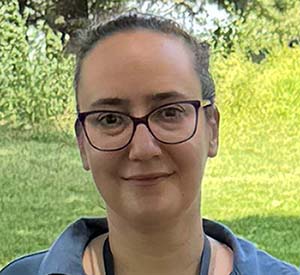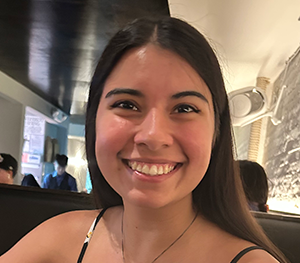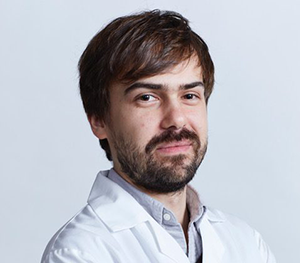
EMILY BERNSTEIN, PhD
Principal Investigator
Mount Sinai Profile
Emily Bernstein, PhD

ALJA PIRHER, PhD
Postdoctoral Fellow
Alja Pirher, PhD
Neuroblastoma (NB) is the most common extracranial solid tumor in children. Alterations in the chromatin remodeler ATRX define a high-risk NB subgroup characterized by poor prognosis and limited therapeutic options. These alterations frequently generate ATRX in-frame fusion (IFF) proteins that lack essential chromatin-binding and interaction domains, potentially conferring new, alternative functions. Alja is particularly interested in understanding how ATRX IFFs sustain the NB phenotype by identifying novel binding partners and dissecting the mechanisms through which these fusions reprogram transcriptional networks. Her ultimate goal is to uncover critical ATRX IFF interactors that drive oncogenic transcriptional programs and represent potential therapeutic targets.

FARBOD HATAMI, MD
Postdoctoral Fellow
Farbod Hatami, MD

VALENTINA KIRIGIN, MS
Research Associate
Valentina Kirigin, MS

DAN FILIPESCU, PhD
Assistant Professor
Dan Filipescu, PhD
Histone variants are incorporated and exchanged at specific regions of the genome to regulate homeostasis and cellular identity. As such, histone variant dysfunction has profound consequences for tumor cells; however, the role of these chromatin components in the tumor microenvironment (TME) remains unclear. Using an autochthonous, immunocompetent primary melanoma model, Dan showed that mice devoid of the histone variant macroH2A develop larger tumors, underpinning a compromised anti-tumor immune response. This stems from intrinsic upregulation of inflammatory genes in cancer-associated fibroblasts (CAFs), where macroH2A deficiency leads to rewiring of 3D chromatin interactions. Dan is using his expertise with in vivo tumor models, in vitro cell biology, various modalities of large-scale data analysis (e.g., single cell RNA-seq, spatial transcriptomics, and epigenomics), and distinct compartments of the TME, to define how epigenetic modulation of CAFs directs their phenotype, in turn affecting immune cell activity in melanoma.

DAN HASSON, PhD
Associate Professor
Dan Hasson, PhD
Dan’s main research interest is focused on understanding the functional role of cis DNA regulatory elements in cancer initiation, progression, metastasis, and dormancy. Dan also studies the role of chromatin remodelers and transcription factors (TFs) that control the functional output of these elements, as well as the 3D chromatin structure associated with their regulation. Dan utilizes innovative genomic approaches and computational tools to support our laboratory’s studies investigating the role of epigenetics in cancers such as melanoma and neuroblastoma. Dan is also Co-Director of the Bioinformatics for Next Generation Sequencing (BiNGS) core of the Tisch Cancer Institute.

SAUL CARCAMO, PhD
Lead Bioinformatician
Saul Carcamo, PhD
Dr. Carcamo is a senior bioinformatician in the Bioinformatics for Next Generation Sequencing (BiNGS) Shared Resource of the Tisch Cancer Institute. Dr. Carcamo’s thesis dissertation focused on chromatin remodeling alterations in cancer. He has expertise in performing and analyzing epigenetic and transcriptomic genome-wide datasets. More specifically, Dr. Carcamo is an expert in analyzing ATAC- and ChIP-seq data, integration of epigenetic and transcriptomic data, and the analysis of TF networks.
Lab Alumni : See where former lab members are now!
